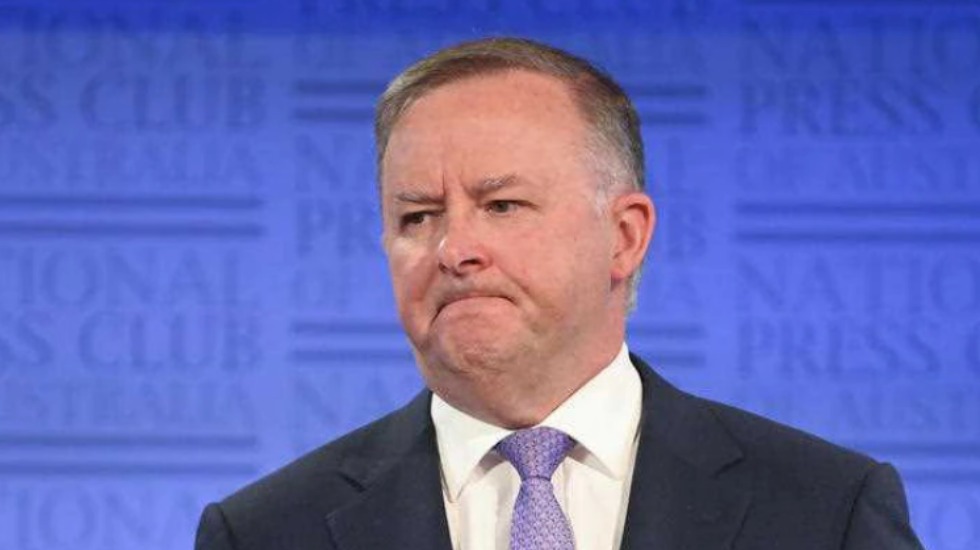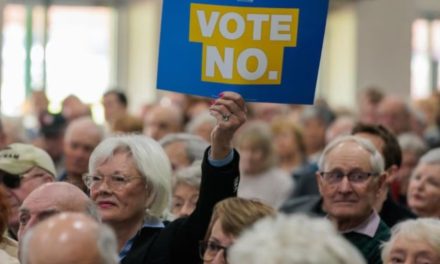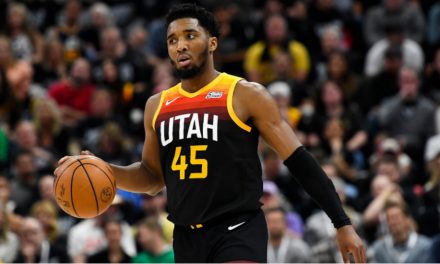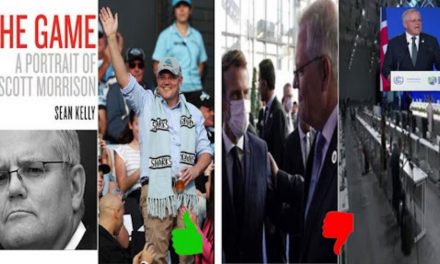Andrew Gardiner says the Australian Labor Party is like a “deer in the headlights” under Anthony Albanese.

“Something’s got to happen”: old school enforcers like North Melbourne’s Sam Kekovich were known to mutter those words (or a close variant) before embarking on some extreme, ‘extracurricular activity’ to dig their team out of a hole. In the case of late 1960s/early 1970s North Melbourne, that was often.
The same goes double for those struggling Shinboners of politics, the Australian Labor Party. They don’t need an enforcer; they need a rebuild, starting with an ideological spine.
Scott Morrison’s LNP government is beset with problems. There’s the remorseless response to the ‘wank desk’ scandal, the botched vaccine rollout, international pariah status on climate change, diabolical message management over the Christine Holgate saga, a callous persistence with the Robodebt scheme and a Budget that – despite profligate, pre-election spending – delivers lower wages for low-paid workers and cuts to the social safety net.
Under such circumstances, you’d expect the government to be at long odds for re-election, but take a look at this:

That’s right: at a time in our political history when governments struggle to last two terms in office, Morrison’s mob, late in a scandal-plagued third term, is favoured to hang on.
The Chaser’s Charles Firth sums it up succinctly: “Morrison is staggeringly out of touch and will also definitely win the next election”. For such contradictions to coexist in the space of a sentence, something must be seriously wrong with Labor.
Like the North Melbourne for which Kekovich debuted in 1968, Labor is mired in a cycle of mediocrity it just can’t break. Factionalism and fiefdoms are the order of the day, brimming with common or garden careerists seemingly more interested in their own agendas than the policy goals Labor purportedly stands for.
Labor’s membership base is anaemic, Australia having regressed into one of the least unionised countries in the OECD. Less than 15 per cent of Australian employees are in a union, compared to 40 per cent in 1992.
Readers wondering why Labor can’t produce another Whitlam or Keating would do well to ponder that number.
Of course, if Labor ever got its act together, the party would still face an uphill battle getting its message across. Australia’s media landscape is dominated by a multinational corporation, News Corp, operating what our last Labor PM, Kevin Rudd, described as a “protection racket” for Morrison.
True to form, News Corp outlets last week described a Federal Budget with its fair share of problems as an “election injection” which would generate a “full-strength recovery”, thereby justifying Morrison’s re-election.

News Corp front pages following last week’s Federal Budget.
It isn’t just Rupert Murdoch looking after the incumbent. Some 97 percent of the privately-owned news media is controlled by a select elite, none of whom are known Labor sympathisers.
Joining News Corp is Nine Entertainment (chaired by none other than Peter Costello), Seven West Media (owned by mining magnate Kerry Stokes, employer of accused war criminal Ben Roberts-Smith) and CBS Viacom, controlled by the billionaire American Redstone family. There’s not a card-carrying socialist among them.
In the Sydney/Melbourne media markets (including the ABC) aggregators cited by the University of Michigan School of Information point to a prevailing right-of-centre bias:

Of the media cited above, more people consume their news from commercial television and the News Corp tabloids, all of them right-of-centre.
This renders Labor’s messaging a Herculean task, especially at election time, when Andrew Bolt, Miranda Devine, Piers Akerman, Alan Jones, Peta Credlin, Chris Kenny, Janet Albrechtsen, Tim Blair, Gerard Henderson and a conservative commentariat for which there is no left-wing equivalent can be counted upon to catapult the propaganda with military discipline.
Perhaps not surprisingly, therefore, Labor this year adopted a ‘small target’ post-Budget strategy of modest policy proposals that don’t “scare the horses” or present an opening for the commentariat to scream “socialism!” in choreographed unison.
There was a $10 billion social-housing program, clean-energy apprenticeships and start-up loans for students. These were all very admirable, but devoid of something fundamental like, y’know, wage and safety-net relief for the battlers.
As if to echo these restraints on a rhetorical level, Opposition Leader Anthony Albanese’s budget response made little mention of its drawbacks: “The gap between the (Budget) announcement and the delivery is the thing to watch out for.” Thanks for the pep talk, ‘Albo’; I wish I could say I felt inspired.
In truth, Labor is like a deer in the headlights of this government and its media enablers. Its last leader, Bill Shorten, was crucified by the conservative commentariat after going big on policy before the 2019 election.
Chastened by the experience, Labor circa 2021 is hoping dissatisfaction with Morrison will do the job of electing ‘Albo’ for them, just as Labor under Kim Beazley, the original small target, did 20 years ago. That didn’t end well, because a chunk of Labor’s natural constituency weren’t inspired by lacklustre ALP policies (take note, ‘Albo’) and didn’t see a compelling reason to stick when John Howard ‘wedged’ them with stories of scary Muslims during the Tampa crisis.
PLEASE HELP US CONTINUE TO THRIVE BY BECOMING AN OFFICIAL FOOTYOLOGY PATRON. JUST CLICK THIS LINK.
Have you noticed how the current government is now fear-mongering over Chinese expansionism and scary brown Covid patients returning from India? There’s nothing new under the sun, readers; if Labor doesn’t learn from its recent history, it’s surely bound to repeat it.

Joe Biden: Progressive Icon? Illustration: Eliana Rodgers / NBC News
In many ways, the US political landscape has been a mirror image of our own: a major party on the right fighting culture wars over immigration, the treatment of racial and ethnic minorities and the denigration of latte-sipping ‘elites’ (among other wedges), a Murdoch-led corporate media eager to litigate those battles for the right in the court of public opinion, and a major party on the centre- left which doesn’t know whether to shit or go blind in response. What a surprise it is, then, that the morass of the Trump years coughed up a progressive icon who’s willing and able to fight back.
His name is Joe Biden. I know, right?
“I don’t think it could have been any better if (self-declared socialist) Bernie Sanders was the president,” Larry Cohen, a former union leader who chairs the Sanders-aligned group Our Revolution, told NBC.
A list of Biden’s achievements and objectives makes impressive reading. $1.9 trillion in Covid-19 relief, pulling out of Afghanistan, rejoining the Paris Climate Accord, proposals for $2.25 trillion for infrastructure and jobs, a $15-an-hour minimum wage, curbs on police brutality, an expansion of Medicare (currently only available for people aged 65 or older), modest gun law reform, permanent residency for young immigrants residing in the US unlawfully after being brought there by parents, an expansion of Obamacare and cuts in greenhouse gas emissions that put our own targets to shame.
Some of the above mightn’t sound all that exciting to Australian readers, but remember: this is America, where some progressive ideas are at an earlier stage of fruition. The point is they’re moving forward, and so can we.
Perhaps most important of all, Biden signed an Executive Order on “Worker Organising and Empowerment”. Its objectives include “facilitat(ing) worker organising across the country”, helping unions overcome various laws that make it harder for them to organise, and “increasing union membership” to “grow a more inclusive middle class.”
Are you listening, ‘Albo’? If you want union membership (your most loyal base) back up to halcyon heights, you might want to do something similar.
Notwithstanding his ‘go-big-or-go-home’ approach on many fronts, Biden has picked his battles. He’s made no moves to liberalise marijuana laws, despite decriminalization in some US states.
Nor has he deviated markedly from the norm on America’s support for Israel, despite that government’s incendiary policies and their current, murderous results. To do so would be political suicide in a country where the American Israel Public Affairs Committee (AIPAC) wields more power than such behemoths as the NRA.
Biden’s people have been strategic. They ‘gamed out’ how their proposals would play out and fought hard for the outcomes they could achieve.
Pre-election, they put substantial, but well-thought-through, policy space between themselves and their opponents (something ‘Albo’ is barely doing) without revealing the full extent of their plans. In-so-doing, they avoided the kind of attacks that eviscerated Shorten in 2019.
Some would call this dishonest; in a media environment skewed heavily towards the other side, I call it smart. Once elected, they went hard, and it’s paying off.
The results so far speak for themselves: in America (of all places) the left is winning. Australian Labor, take note.

Fortunately for Sam Kekovich (above) something did happen during his stay at North Melbourne. In came Allen Aylett, Ron Joseph, a bloke named Barassi and a truckload of stars under the 10-Year Rule. Just as importantly, out went a club culture of factionalism and mediocrity.
For Labor to enjoy the political equivalent of North’s subsequent success in the mid-to-late 1970s, it too must jettison the dead wood and improve its culture. Only then can it emulate the Biden Administration: bold on policy in the face of a skewed media landscape, and strategic when it needs to be.
Above all, Labor can’t backslide into policy promiscuity. Rather than hiding from who they are, they’ve got to bang away with a narrative that promotes their cause and engages their base.
Biden and the US Democrats have embraced what could turn out to be a solid, durable mechanism for staying strong on policy. At a recent meeting, White House chief of staff Ron Klain told progressive politicians: “Keep pushing us. Keep us honest.”
In other words, Biden is inviting the left to use his own pragmatism as leverage on policy. Without a united caucus, bold policy commitments would be impossible; without bold policy commitments, voter engagement evaporates; without voter engagement, Biden’s presidency ends after one term.
It’s in everyone’s interests. Assuming good faith (a big assumption, admittedly) this mechanism for driving a progressive agenda is self-sustaining. Let’s see if Labor can build one here.











